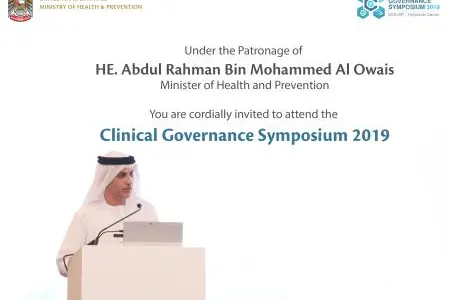PHOTO
Dubai: Under the patronage of HE Abdul Rahman bin Mohammed Al Owais, the Minister of Health, the Ministry of Health and Prevention, MoHAP, held the Clinical Governance Forum at Hotel Raffles Dubai.
The two-day event witnessed the launching of the Clinical Governance of the Hospitals Sector under the theme “Our Way to Clinical Excellence”. The strategy aims to enhance the culture of patient-centric culture innovation through the provision of high-quality, sustainable, safe, and effective healthcare services.
This comes as part of MoHAP’s strategy to explore the healthcare future and to renovate health service to improve patient safety in accordance with the best international practices.
The forum was held in the presence the Undersecretary of the Ministry of Health and Prevention and MoHAP Assistant Undersecretaries, with the participation of over 400 attendees, including experts, lecturers and consultants from the World Health Organization (WHO), the Kingdom of Saudi Arabia, United States and Australia, as well as healthcare leaders and directors in government and private institutions, and healthcare providers including doctors, pharmacists, nurses and technicians.
Several essential clinical governance-related topics have been tackled including; enhancing clinical governance as a key element in today’s healthcare system, understanding the clinical governance structure (current & future) in various healthcare facilities, exploring ideas, opportunities, enabling factors, and challenges related to the optimal clinical management, exchanging best practices in healthcare policies, achieving the best methods to turn clinical governance into a daily reality, and coming up with tangible strategies to implement the best levels of clinical governance.
Extrapolating the Recent Trends of Health Systems
HE Abdul Rahman bin Mohammed Al Owais, the Minister of Health, said: “This forum comes falls within MoHAP’s vigorous efforts to promote healthcare quality and standards by extrapolating the world’s new trends of health systems. This would help us provide future vision-based healthcare qualities that surpass people’s expectations and achieve a sustainable and effective health system in line with the UAE Vision 2021 National Agenda.”
He added: “Our initiatives and programs aim to reinforce the UAE’s position on the future healthcare agenda, innovate unique solutions to the future of health services, control chronic diseases, and provide up-to-date therapeutic methods. This can be achieved by incorporating AI and VR technologies and smart apps into health services, as well as providing telemedicine health services and other updates in health sciences to explore the future and achieve a sustainable health system aligned with the UAE Centennial 2071,”
Al Olama: Focusing on Patient-Centric Innovation Culture
For his part, HE Dr. Mohamed Salim Al Olama, the Undersecretary of the Ministry of Health and Prevention, said: “The forum comes as part of MoHAP’s keenness on boosting healthcare sector capabilities and infrastructure, enhance innovation and other services based on modern technologies, and continuing the necessary rehabilitation of medical cadres, so as to enable the health sector to implement the world’s best practices and standards in the medicine and healthcare fields and to promote patient-centric innovation culture.”
“This forum is constituting an advanced platform for developing the hospital’s corporate governance and enabling the clinical management to become the essence of therapeutic practices,” he added.
Al Olama pointed out the Clinical Governance Strategy provides a joint vision on developing and improving quality and patient safety-oriented, hoping that the forum will bear fruit through the concerted efforts of experts and local and international competencies to adopt Sustainable Governance Strategies for the improvement of healthcare quality.
Al Serkal: A Reference Framework to Enhance Patient Safety
HE Dr. Youssif Al Serkal, Assistant Undersecretary for the Ministry’s Hospitals Sector, said: “The main goal of adopting the clinical governance is to elevate hospitals efficiency by upgrading the organizational performance and commitment to principles of transparency and accountability, within a reference framework for medial and administrative cadres at hospitals.”
“At present, clinical governance represents the cornerstone of the world’s healthcare systems and it's also an enabling structure that puts patient safety as a top priority. We have counted on several reference sources and pioneering international experiences in the clinical governance field upon the restructuring and development of our new strategy,” added Al Serkal.
“The new strategy will help upgrade performance standards and the overall policies, procedures, protocols, guidelines and clinical work systems, and provide medical teams with the latest strategies to develop clinical work, and improve treatment in accordance with the best international practices. In the meantime, the Hospitals Sector is working on developing central guidelines to standardize clinical practice criteria and monitor a number of the key performance indicators by the Medical Governance Office,” he explained.
Concluding his remarks, Al Serkal said: “Our today’s goal is clear and we are possessing all enablers that help achieve this goal. We are also able to achieve excellence in all administrative and service fields and speed up the process of establishing an integrated health system as per international standards to provide competitive health services locally and globally. Therefore, the Hospitals Sector is always striving to keep pace with health, therapeutic, and modern technological developments, not only that but incorporating them into its work scope to achieve patient happiness and satisfaction.”
Objectives of Clinical Governance Strategy
The Strategy sets a joint vision for hospitals with the aim of improving patient-centered care quality, enabling clinical management to become the essence of therapeutic practices, restructuring the organizational framework, methods of accountability, and compliance with quality standards. This would help enhance patient’s confidence in receiving permanent safe healthcare in line with MoHAP’s strategy to provide world-class, comprehensive, and integrated healthcare services.
The objectives of the clinical governance strategy are aligned with MoHAP’s strategy to ensure the provision of outstanding healthcare services as per international standards. This includes; ensuring the adoption of a cohesive and integrated approach for the healthcare provision, promoting the proper involvement of patients and their families in therapeutic protocols, and boosting the effective cooperation between various cadres at hospitals and stakeholders within multidisciplinary groups through rehabilitation and self-assessment methods.
The objectives also include developing reliable predictive systems to manage potential clinical risks, patient safety, and accumulating practical experiences from adverse events and patient experiences conducive to sustainable change.
Among the objectives of the Clinical Governance Strategy is to Minimize scattered information through precise data usage and performance indicators, using PaCE to analyze massive data, predictive models of health facilities, and other quality improvement tools to provide innovative patient care solutions.
4 Key Pillars & 20 Paths
The Clinical Governance Strategy leans on 4 key pillars and 20 paths including; clinical efficacy that ensures timely and appropriate treatment, interventions, support, and services, including evidence-based practices to direct therapeutic decision, and systematically developing guidelines to assist physician and patient in making decisions about appropriate healthcare according to diagnostic data.
In addition, it includes measuring care outcomes by creating key performance indicators, clinical review to improve quality, cutting expenses, and promoting research and development work to improve patient care.
While the Risk Management & Patient Safety is featuring 4 outputs to reduce risks that may patients, staff, volunteers, visitors and the hospital be exposed to, manage medical complaints with integrity and responsibility, evaluate and analyze medical errors to identify the reasons and come up with the recommendations, in addition to strengthening patient safety program.
The Constant Improvement Pillar focuses on evaluating and setting standards of excellence for each discipline and applying them to all hospitals, continuing education and training for hospital personnel, continuous professional development to improve quality, innovations and new ideas to help hospitals implement best practices, achieve excellence in clinical care, improve quality and comply with quality standards.
Tolerance and Patient Rights
The Patient-Centered Care or the Non-Targeted Treatment Pillar is focusing on tolerance in line with the outcomes of the UAE’s Year of Tolerance, by receiving feedback from patients, caregivers and staff to help implement a valuable, effective and flexible governance model that encourages positive engagement with those involved in healthcare process, which is one of the foundations of a sustainable clinical governance strategy.
The Patient Information Pillar promotes the protection of patient rights under the UAE Patient Rights & Responsibilities Charter and allows complaints against poor service or malpractice to be submitted to the relevant health authorities.
While the last pillar emphasizes the importance of voluntary work at MoHAP’s hospitals to contribute to the provision of valuable community resources.
-End-
For further information please call:
04 230 1605
04 230 1614
Disclaimer: The contents of this press release was provided from an external third party provider. This website is not responsible for, and does not control, such external content. This content is provided on an “as is” and “as available” basis and has not been edited in any way. Neither this website nor our affiliates guarantee the accuracy of or endorse the views or opinions expressed in this press release.
The press release is provided for informational purposes only. The content does not provide tax, legal or investment advice or opinion regarding the suitability, value or profitability of any particular security, portfolio or investment strategy. Neither this website nor our affiliates shall be liable for any errors or inaccuracies in the content, or for any actions taken by you in reliance thereon. You expressly agree that your use of the information within this article is at your sole risk.
To the fullest extent permitted by applicable law, this website, its parent company, its subsidiaries, its affiliates and the respective shareholders, directors, officers, employees, agents, advertisers, content providers and licensors will not be liable (jointly or severally) to you for any direct, indirect, consequential, special, incidental, punitive or exemplary damages, including without limitation, lost profits, lost savings and lost revenues, whether in negligence, tort, contract or any other theory of liability, even if the parties have been advised of the possibility or could have foreseen any such damages.











